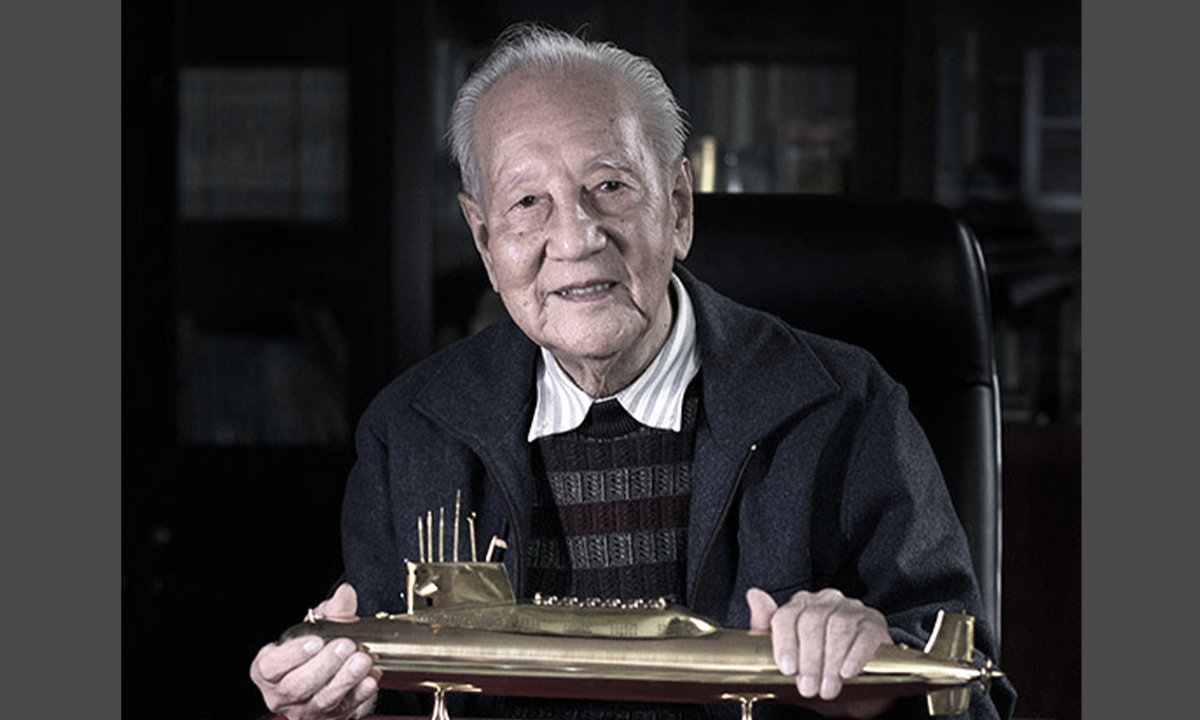
Photo:Xinhua
Huang Xuhua, an academician of the Chinese Academy of Engineering, recipient of the Medal of the Republic, and chief designer of China's first-generation nuclear submarines, passed away at the age of 99 on Thursday due to illness despite medical treatment in Wuhan, Central China's Hubei Province, according to an obituary on Friday.
Huang led research and development on the nation's first nuclear submarines - the Type 09I nuclear-powered attack submarine and the Type 09II nuclear-powered ballistic missile submarine - from the 1950s to the 1980s, according to Chinese media reports.
His work had been a secret for three decades. He and his team launched China's first nuclear submarine in 1970, with all performances exceeding those of the first US nuclear submarine in 1954, the Xinhua News Agency reported.
As the Chinese Navy has gradually declassified its first-generation nuclear subs, the stories of Huang and his fellow designers have become widely known and their reputations have been burnished. Huang is known as the "father of China's nuclear submarines," according to media reports.
Huang was an outstanding member of the Communist Party of China (CPC), an academician of the Chinese Academy of Engineering, recipient of Medal of the Republic and the country's top science award, a national moral model, the chief designer of China's first-generation nuclear submarines, and the former director, Party secretary and honorary director of the 719 Research Institute of China State Shipbuilding Group Corporation, according to the obituary issued by Huang's Funeral Committee on Friday.
Born in Guangdong Province in 1926, Huang later joined a research institute of the former China Shipbuilding Industry Corporation, and has been engaged in the research and development of nuclear submarines for about 30 years. He won the Medal of the Republic in 2019 for his outstanding contributions to the nation, according to the Xinhua News Agency.
From 1945 to 1949, Huang studied at the Shipbuilding Engineering Department of National Chiao Tung University (now Shanghai Jiao Tong University). He joined the CPC in April 1949 and was one of the pioneers and founders of China's nuclear submarine program, according to a release from the WeChat public account of China State Shipbuilding Corporation Limited.
Huang's life was like a submarine in the deep sea—silent, but with boundless power. In 1958, due to his outstanding political qualities and superb professional skills, he was secretly called to Beijing. From that point, he worked in secrecy for 30 years, devoting himself to China's nuclear submarine program. Together with the first-generation nuclear submarine research team, he started from scratch, focusing on research, overcoming difficulties, and pushing forward relentlessly, according to the release.
The release also noted that Huang's life was one of outstanding achievements and brilliance. From 2017 to 2020, he was awarded national-level honors three times by President Xi Jinping and spoke as a representative. For example, in 2014, he was honored as a "Person of the Year in China 2013"; in 2018, he received the title of "Influential Chinese in the World"; in 2019, he was awarded Medal of the Republic; and in 2020, he received the highest science and technology award of the nation for 2019.
Huang also cared deeply about the long-term development of national science and technology, nuclear submarine work, and the healthy growth of future generations. He donated over 20 million yuan of his earnings to scientific research, popular science, and educational institutions, according to the release.
Huang dedicated his life to the development of China's nuclear submarine industry and national defense, making extraordinary contributions. Through his silent, selfless, fearless, and regret-free life, he faithfully practiced his vow to fight for the communist cause, read the release.













